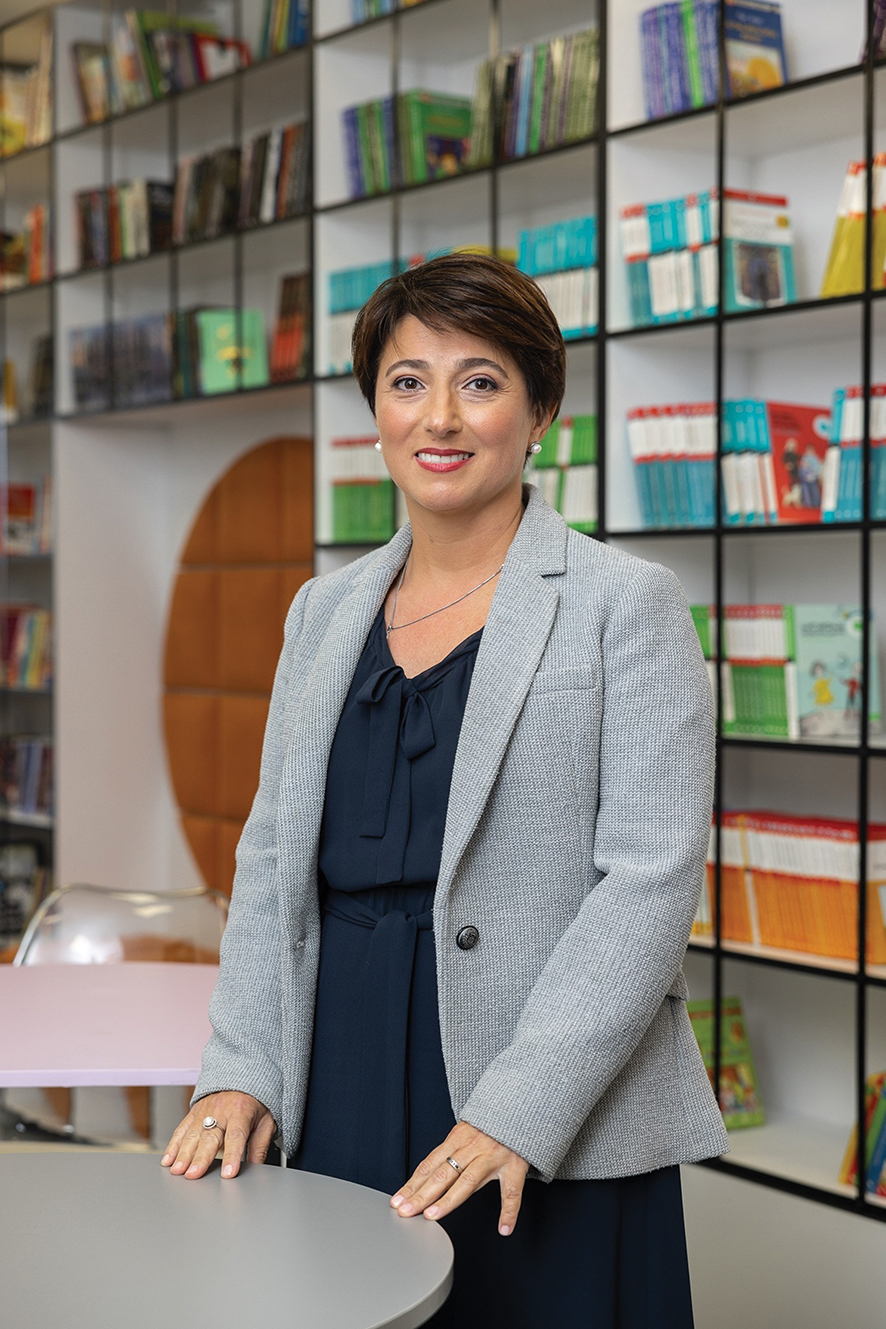Since Georgia’s spotlight moment as Guest of Honor at the 2018 Frankfurt Book Fair, the country’s publishing industry has undergone significant transformation—in some regards promising, in others deeply challenging. At the heart of this evolving story are people like Tina Mamulashvili, Managing Director of Sulakauri Publishing, and Elisabed Pirtskhalava, International Project Manager at Palitra L Publishing. As Georgia returns to Frankfurt this year, their reflections offer insight into how far the industry has come—and where it may go next.
Tina Mamulashvili begins with a frank assessment: “In two words, the Georgian publishing industry has grown since 2018. We’ve seen a noticeable increase in the number of titles in print, sales figures, and even the number of publishers and bookstores across the country. But it’s been hard to measure this growth with precision—there hasn’t been proper field research since then.”
While domestic growth continues, she notes that one crucial area has suffered: “Foreign rights sales have dropped dramatically in the past few years. That’s been one of our most painful setbacks.”
Much of this downturn, Tina explains, is linked to what came after Georgia’s triumphant performance at Frankfurt in 2018. “Our Guest of Honor year was one of the most remarkable presentations the fair had ever seen—international colleagues and even the fair’s own staff said so. But instead of building on that momentum, cultural policy shifts at home halted our progress. The National Book Center, which had led those efforts, was first abolished and then later merged into the Writer’s House after heavy pressure from publishers and writers. Unfortunately, that new structure has been largely dysfunctional—especially as most contemporary Georgian authors and publishers are now boycotting it.”
The original vision of the 2018 program wasn’t just to showcase Georgian literature—it was to give it global reach. “Georgian is a complex language,” Tina says. “Very few foreigners learn it, and even fewer try translating it. That’s why the preparatory work was so important—workshops for translators, editorial visits, public readings, and perhaps most significantly, the translation subsidy program that helped international publishers take a chance on Georgian literature.”
This approach paid off. “In 2004, we had four translated titles. By 2017-18, that number had jumped to over 150. But over the past three years, those gains have started slipping away.”

For Elisabed Pirtskhalava, this year’s return to Frankfurt carries even more weight because of these setbacks. “The Frankfurt Book Fair becomes more significant each year,” she says. “Especially now, during politically challenging times, it feels essential to make sure Georgian literature doesn’t fall off the international radar.”
The Georgian Collective Stand—organized independently by a group of publishers after the boycott—will once again feature prominently, supported by the Civil Society Foundation, the Goethe-Institut, and others. This year, the stand’s motto, “Georgian Characters Standing Up for Democracy and Freedom,” resonates with both the literary and political climate back home.
“We’re taking rights sales more seriously than ever,” Elisabed explains. “It doesn’t matter whether it’s children’s literature or adult fiction—the urgency to get Georgian voices in front of global readers is undeniable.”
Asked how she sees Georgia positioned in today’s international publishing landscape, Elisabed is optimistic. “We’re gaining momentum. Global audiences are beginning to recognize the distinctive and powerful voice of Georgian writers. It’s long overdue, and it’s incredibly gratifying to see agents finally noticing the originality and depth Georgian authors bring to the table.”
Still, serious challenges remain—especially when it comes to bringing these voices to international markets. “One of the biggest obstacles is funding,” she says. “The boycott of some key institutions has meant fewer resources for translations, which are critical for a language like Georgian. And then there’s the issue of perception—some publishers still assume literature from smaller countries has limited relevance. That’s just wrong. Georgian stories are deeply human and globally resonant.”
This year’s Frankfurt program features more than ten authors across a broad spectrum of genres and generations. Elisabed is especially excited about White Magnolia, a detective novel that dominated Georgian bestseller lists, and debut author Tako Tsulaia, just 23 years old and already the recipient of multiple literary awards.
“We’re also reintroducing some of our top children’s authors,” she adds, “like Vaso Guleuri, Tamri Pkhakadze, and Lela Tsutskiridze—writers whose books have universal appeal for young readers worldwide.”
Tina Mamulashvili emphasizes other key names appearing at Frankfurt this year. “We’re presenting a brilliant new coming-of-age novel by Tinatin Nogaideli, which explores identity and family with such emotional clarity. And then there’s Archil Kikodze and Lasha Bugadze, two of our most respected voices. Both are releasing new novels that tackle Georgia’s current social and political climate. Kikodze’s will be out by the end of 2025, with Bugadze’s following shortly after.”
She’s also particularly proud to be showcasing Ekaterine Togonidze’s novel Home—Him, now available in a new German translation by Austrian publisher Septime Verlag. “And of course, we’re building on the success of Tamta Melashvili’s Blackbird Blackbird Blackberry, which has seen incredible reception in Poland this year.”

As for strategic goals at Frankfurt, Elisabed says they’re thinking beyond regional markets. “We’re targeting central Europe, Asia, and the U.S. Our goal is to make sure both Georgian writers and illustrators gain visibility where it matters. And we’re looking for more than just rights deals—we’re also seeking speaking engagements and platforms where our authors can share their voices directly.”
Reflecting on the past two decades of international work, Tina shares how far Georgian publishing has come. “I first visited the Frankfurt Book Fair in 1999. Back then, it was a breakthrough just to buy translation rights. We were also the first to sell the rights to Aka Morchiladze, one of Georgia’s most prominent authors. Over time, more Georgian publishers joined the fair, and the relationships we built changed everything.”
These connections were institutionalized in 2007 with the launch of the Georgian National Stand, funded by the Ministry of Culture through the National Book Center. Tina believes this helped establish Georgia as a serious player in global publishing. “That sense of belonging—we felt it, and I believe our international partners did too.”
She points out that Georgian publishers now hold key roles in global institutions. “Gvantsa Jobava, for instance, is the current Chairwoman of the International Publishers Association. And I serve on the board of the European Educational Publishers Group. These are signs of how far we’ve come.”
But perhaps more importantly, Tina sees this year’s return to Frankfurt as a statement of resilience.
“Despite political interference and institutional instability, we’ve refused to step back from international engagement. The Georgian Collective Stand isn’t just a trade platform—it’s a cultural act. It represents not just publishers, but the dramatic events shaping our country.”
Elisabed agrees. “This journey has been transformative—for our literature, our industry, and for all of us who believe in the global power of stories. We’ve shown that even in the face of adversity, Georgian literature refuses to be silenced.”
And with that determination, Georgian publishers once again bring their voices, characters, and stories to the world stage—standing up for freedom, democracy, and the enduring value of literature.
By Katie Ruth Davies














